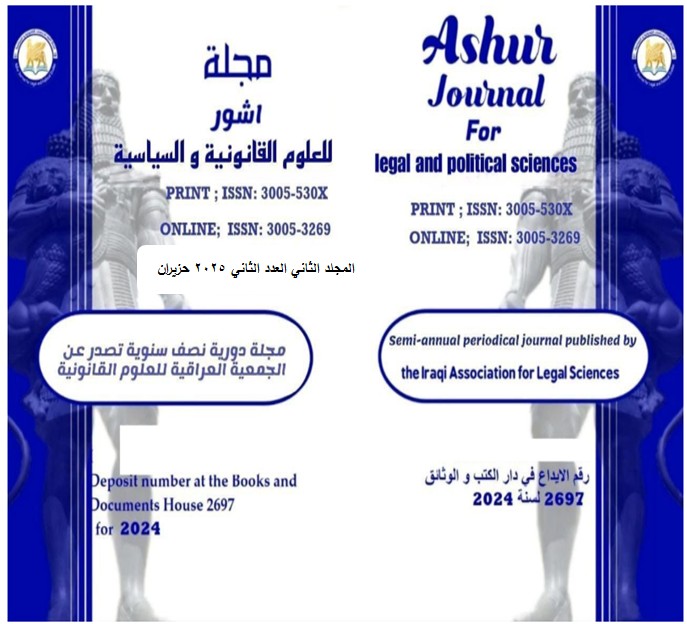مبدأ استمرارية الدولة في ظل الحكومات السيبرانية والمنفى الرقمي دراسة تحليلية في ضوء القانون الدولي العام
DOI:
https://doi.org/10.64184/ajlps.V2.I2.Y2025.P578-600.61الكلمات المفتاحية:
استمرارية الدولة، الحكومة السيبرانية، المنفى الرقمي، السيادة، القانون الدولي العام، الشخصية القانونية الدولية.الملخص
تتناول هذه الدراسة مبدأ استمرارية الدولة، من خلال استعراض الإطار المفاهيمي والتطبيقي لهذا المبدأ في القانون الدولي العام، مع التركيز على مدى قابليته للتكيّف مع التحولات الحديثة في شكل الحكومات، وبوجه خاص ظاهرتي الحكومات السيبرانية، والحكومة في المنفى الرقمي. وتسعى الدراسة إلى تحليل مدى شرعية استمرار الشخصية القانونية الدولية للدولة في ظل غياب السيطرة الفعلية على الإقليم الجغرافي، معتمدةً على اجتهادات القضاء الدولي، والفقه القانوني، والممارسات العملية الحديثة. وقد خلصت الدراسة إلى أن مبدأ استمرارية الدولة، بوصفه من المبادئ المستقرة وغير المكتوبة، يسمح بمرونة قانونية تتيح استمرار الدولة رغم الظروف القاهرة، شريطة توافر عدد من الشروط مثل وجود حكومة شرعية، الحفاظ على الالتزامات الدولية، واستمرار التمثيل الخارجي. وتوصي الدراسة بضرورة تطوير إطار قانوني خاص بالحكومات الرقمية أو المنفية في العصر السيبراني، بما يعزز من شرعيتها الدولية ويوفر الحماية القانونية لها.
المراجع
First: Books in Arabic
1. Dr. Muhammad Sami Abdel Hamid, Public International Relations Law, Cairo, Dar Al Nahda Al Arabiya, 2002.
2. Dr. Muhammad Al Majzoub, Public International Law, Beirut, Al Halabi Legal Publications, 2009.
3. Malcolm Shaw, Public International Law, translated by Dr. Talat Abdel Salam, ninth edition, Cambridge University Press, 2021.
Second: International Agreements and Documents
1. Montevideo Convention on the Rights and Duties of States of 1933.
2. Vienna Convention on the Law of Treaties, 1969.
3. International Court of Justice, Advisory Opinion on the Legality of the Threat or Use of Nuclear Weapons, I.C.J. Reports 1996.
4. International Court of Justice, Advisory Opinion on the Declaration of Independence of Kosovo, July 22, 2010.
5. United Nations Security Council Resolution 662 (1990), UN Doc. S/RES/662 (1990), of 9 August 1990.
6. United Nations General Assembly Resolution 45/240 of 21 December 1990 on the situation between Iraq and Kuwait.
7. United Nations General Assembly Resolution 2758 (XXVI), on the restoration of the rights of the People's Republic of China in the United Nations, adopted on 25 October 1971.
8. Report of the Secretary-General on the situation in Afghanistan, document S/2022/64, dated 28 January 2022.
Third: Foreign References
1. Shaw, Malcolm N., International Law, 8th ed., Cambridge University Press, 2017.
2. Shaw, Malcolm N., International Law, 9th ed., Cambridge University Press, 2021.
3. Crawford, James, Brownlie’s Principles of Public International Law, 9th ed., Oxford University Press, 2019.
4. Crawford, James, The Creation of States in International Law, 2nd ed., Oxford University Press, 2006.
5. Talmon, Stefan, Recognition of Governments in International Law, Oxford University Press, 1998.
6. Grant, Thomas D., The Recognition of States: Law and Practice in Debate and Evolution, Praeger, 1999.
7. Dugard, John, Recognition and the United Nations, Cambridge University Press, 1987.
8. Cassese, Antonio, International Law, 2nd ed., Oxford University Press, 2005.
9. Brownlie, Ian, Principles of Public International Law, 7th ed., Oxford University Press, 2008.
10. Gray, Christine, International Law and the Use of Force, 4th ed., Oxford University Press, 2018
11. Marek, Christina, Identity and Continuity of States in Public International Law, Geneva: Librairie Droz, 1954.
12. Schmitt, Michael N. (Ed.), Tallinn Manual 2.0 on the International Law Applicable to Cyber Operations, Cambridge University Press, 2017.
13. Schaap, Arjen, “Cyber Governments in Exile: International Law and Digital State Continuity,” Journal of Cybersecurity and International Law, Vol. 3, 2021.
14. Fenwick, Mark; Vermeulen, Erik P. M.; & Kaal, Wulf A., Regulating Digital Government: Governance, Innovation, and Cyber Sovereignty, TILEC Discussion Paper No. 2020-018,
15. D’Aspremont, Jean, International Law: Foundations and Principles, Edward Elgar Publishing, 2022.
16. Daugirdas, Kristina, “Cyber Governments and the Continuity of Statehood: Rethinking Sovereignty in the Digital Age,” Michigan Journal of International Law, Vol. 43, No. 2, 2022.
17. Melzer, Nils, Cyber Operations and the Use of Force in International Law, Oxford University Press, 2012.
التنزيلات
منشور
إصدار
القسم
الرخصة
يحتفظ المؤلفون بحقوق الطبع والنشر الكاملة لمقالهم المنشور.
تُطبّق مجلة آشور للعلوم القانونية والسياسية (AJLPS) رخصة المشاع الإبداعي المنسوبة 4.0 الدولية (CC BY 4.0) على مقالاتنا وأعمالنا الأخرى. إذا أرسلتَ بحثك للنشر من قِبل AJLPS، فإنك تُوافق على تطبيق رخصة CC BY 4.0 على عملك.
يمكن قراءة المقالات ومشاركتها وفقًا للشروط التالية:
النسبة: يجب أن تُنسب إلى المصدر الأصلي (Attribution).
التفاصيل الكاملة متوفرة على الرابط:
https://creativecommons.org/licenses/by/4.0/






